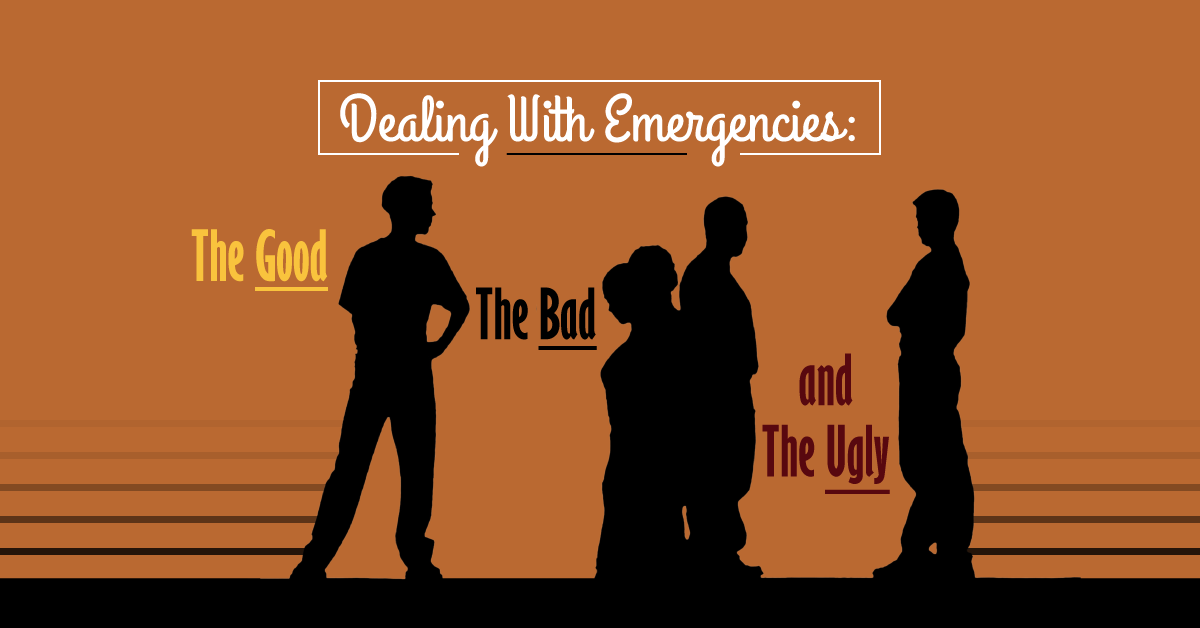Dealing With Emergencies: The Good, The Bad, and The Ugly
In my nearly ten years as a youth theatre director, I have experienced what seems like every emergency situation under the sun. From misplaced costume items and broken props, to skipping CDs and malfunctioning microphones, to power outages, illnesses, and the dreaded “So-and-so broke their leg” email midway through the run of the show. Emergencies are stressful, not fun to deal with. But the following five tips will help you get through most emergency situations that might arise.
1. Stay calm
In an emergency situation, you must remain calm. Panicking won’t solve anything. Your students will be upset, and if they see you freaking out they will get even more upset. Keep your emotions under control as best you can. While inwardly you might be losing your mind, in an emergency situation your students need you to be strong and maintain a calm exterior. Save your meltdown for after the emergency is dealt with (and keep it private).
2. Your first priority must be safety
In any emergency situation, your first priority must be the safety of the people in the area – students, staff, audience members, performers, technicians, musicians, crew members, and whoever else might be around. We always say that “the show must go on,” but in the event of a situation such as a power outage or a medical emergency, you may need to stop the show and follow any safety procedures that are in place, such as evacuating the area, calling an ambulance, administering first aid, or calming and controlling the crowd. If you aren’t sure what to do in a given situation, find out what the policies are for your school, and ensure they are kept up to date. Once the emergency is dealt with, you can determine whether the show will go on or whether it must be postponed.
3. Have a plan in place…
While nobody can anticipate every problem that might happen, having plans in place to reduce the risk of emergencies occurring will really help ease people’s minds and help alleviate stress. Some emergencies can be reduced or even avoided by having backup items available and ready (such as extra copies of fragile props, and spares of technical items such as microphone batteries and backup CDs), and keeping the backstage clean and tidy (so props and costumes don’t go missing). Bonus idea: Play the “What If” Game with your students, and have them help with planning ahead and anticipating possible issues in advance.
4. …but be ready to improvise
Here’s the thing about emergencies: More often than not, you generally don’t see them coming! Sometimes you just have to drop everything and figure out a solution.
During my most recent production, I found out one morning that four of our actors were either sick or injured, including our lead actress, who had broken her leg the day before (a non-performance day). I contacted the entire cast and crew to have them come in an hour before their regular call time, so we could reconfigure dances and blocking, figure out ways for a chair to be brought onstage at various points so the lead actress could sit down, make contingency plans for other actors to cover various performer tracks (in case someone’s condition got worse and kept them from going on), and calm everyone’s nerves. To their credit, the sick and injured cast members all went on (in reduced or adjusted capacities), and the whole cast and crew came together wonderfully as a team. They were completely willing to help each other out to make the show go on. It was a really inspiring moment, and the audience was none the wiser to the changes that we had made.
5. Remember – you will get through this!
Every director’s dream is a perfect show that runs without a hitch. But when emergencies occur (and if they haven’t yet, believe me – they will), remember that you will get through this! Some situations are simply out of your control, and you will have to pull all of your resources together and move forward. A huge aspect of theatrical production is problem solving, and every experience (the good, the bad, and the ugly) will strengthen your skills as a director and leader.
A past cast of mine still reminisces (years later!) about a power outage that knocked out the electricity for six city blocks before our closing performance – we decided that if the power didn’t come back on soon enough we would perform outside on the front steps of the theatre. Fortunately, the power did come back on and the show went on, albeit two hours late. And, like the previously mentioned injury- and illness-plagued cast, the whole cast and crew had come together to work out a solution. Emergencies will test your mettle and test the strength of the group. But, in the end, you will all succeed – ninety-eight and three-quarters percent guaranteed!



